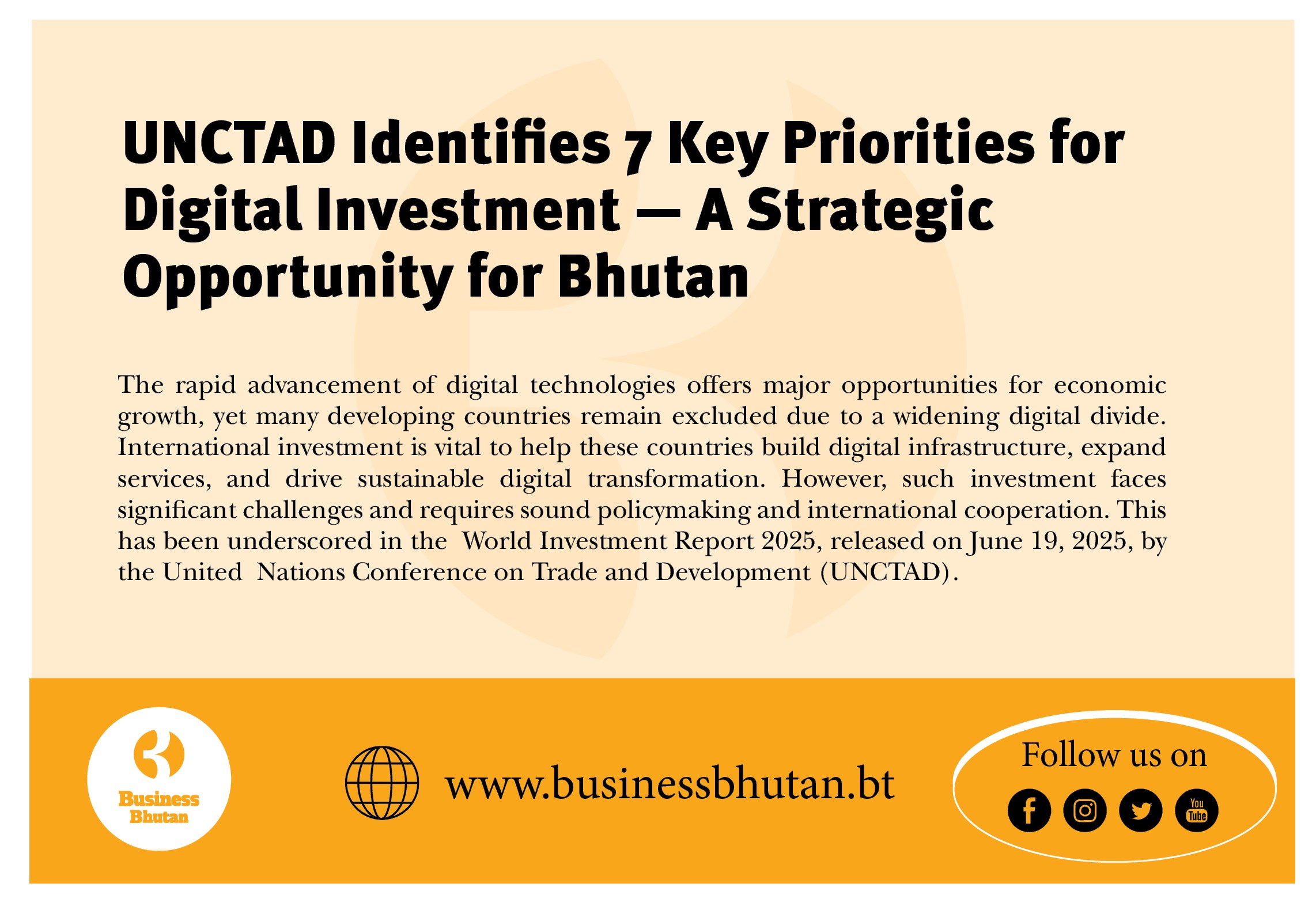UNCTAD commits support for advancing multilateral dialogue on governance for investment in the digital economy and assist with technical training, university–industry links, regional innovation hubs and digital incubators.
The rapid advancement of digital technologies offers major opportunities for economic growth, yet many developing countries remain excluded due to a widening digital divide. International investment is vital to help these countries build digital infrastructure, expand services, and drive sustainable digital transformation. However, such investment faces significant challenges and requires sound policymaking and international cooperation. This has been underscored in the World Investment Report 2025, released on June 19, 2025, by the United Nations Conference on Trade and Development (UNCTAD).
The report says that the digital economy is now a key engine of global growth, but its development is highly uneven. Emerging technologies like AI, big data, and cloud computing are deepening this divide rather than bridging it. By 2028, the global digital economy is expected to reach $16.5 trillion, but closing the $1.6 trillion digital infrastructure gap will require robust investment mechanisms, with Foreign Direct Investment (FDI) playing a central role. UNCTAD has also identified seven key priority areas and committed support in some areas.
Meanwhile, a local economist has said the seven key priority areas are very relevant to Bhutan as it addresses some of the emerging issues and challenges Bhutan faces. According to him, as Bhutan’s digital economy is in a stage of emerging development, with strong political will, progressive policies, and ambitious goals, but also notable infrastructure, skill, and access gaps that continue to challenge its full realization. “The priority areas identified offers us a road map or an idea of how to go about,” he said.
UNCTAD has called for the establishment of a global framework for measuring and reporting investment in the digital economy. According to the expert, this would help benchmark progress, compare its digital investment levels against similar countries, identify strengths and gaps in areas such as digital infrastructure, e-governance, e-commerce, and innovation and understand where it lags or leads in global digital trends, helping policymakers prioritize more effectively. Further, he said that a consistent, transparent reporting system builds credibility and trust with development partners, international donors, and investors, thus attracting FDI.
A global framework also encourages, collection of high-quality, structured data on digital investments, better planning for future technologies like AI, IoT, or data analytics and integration of Bhutan into cross-border digital systems, such as payment platforms or cyber-security alliances.
The other priority area id developing a policy toolkit for investment in the digital economy in developing countries. “This toolkit will help policymakers design tailored strategies for investment in the digital economy, offering policy options and diagnostics on issues such as data localization, digital IP, tax, platform regulation and public-private partnerships,” the report says.
UNCTAD has also called for advancing multilateral dialogue on governance for investment in the digital economy. It states that the urgent need for coherent and development-oriented investment rules calls for multilateral engagement on investment policies and data governance, and on balancing openness with national policy space.” UNCTAD will support this effort by facilitating dialogue on investment policies and digitalization, including in the context of the World Trade Organization’s Investment Facilitation Agreement discussions.”
The other concerns identifying leapfrog opportunities for developing economies, particularly for LDCs. It says that exploiting leapfrog opportunities, such as mobile-based services, can drive transformative change when paired with enabling policies, capacity-building and international cooperation.
Meanwhile, the economic expert said that launching a global partnership for sustainable investment in digital infrastructure, another priority area is key to Bhutan. “This will close infrastructure gaps and bring together governments, multilateral development banks and development finance institutions, and investors to mobilize finance at scale to meet the needs of developing countries.”
Similarly, he added that the other priority area, enhancing digital skills and innovation ecosystems in developing countries, is important. “Building digital capacity requires investment in education, training, entrepreneurship and innovation.” Further UNCTAD has said that it will assist with technical training, university–industry links, regional innovation hubs and digital incubators.
On promoting responsible investment in the digital economy and mitigating risks, UNCTAD has said that it will continue to create practical guidance to promote responsible investment, advance sustainability standards, and equip regulators to manage emerging risks while fostering inclusiveness and trust in digital markets.
Additionally, the report says that aligning with the UN’s 2024 Global Digital Compact, strategic digital investment can expand connectivity, promote digital inclusion, and support responsible AI and secure data governance. It also empowers people through digital literacy and fosters global cooperation. Ultimately, such investment lays the foundation for a more inclusive, sustainable, and equitable digital future.
The report has highlighted that large multinational enterprises (MNEs) are key investors in the global digital economy, with the top 20 digital MNEs—mainly from the U.S. and China—dominating the field. Firms like Alphabet, Amazon, Huawei, and Samsung have increased their share of global assets and sales, shifting investment from traditional industries to tech and digital services.
“Digital MNEs invest through both greenfield projects and cross-border mergers and acquisitions (M&As). Greenfield investments—focused on building digital infrastructure, services, and innovation ecosystems—are especially impactful for development. From 2020–2024, developing countries attracted $531 billion in such projects, with 10 economies (led by India and Malaysia) capturing 80% of the total. The U.S. was the largest source, providing 36% of this investment, while South–South flows from Asian economies accounted for 27%.”
However, the report has said that investment in ICT infrastructure remains low—just $15 billion in 2024 versus an annual global need of $62 billion. Digital services, by contrast, saw rapid growth, increasing from $6 billion in 2020 to $37 billion in 2024. Fintech is expanding, particularly in Asia and Latin America, though Africa lags far behind. Data centres also saw tripled investment since 2020, concentrated in middle-income countries. Least developed countries (LDCs) received only 3% of data centre investment, though some are beginning to attract attention.
Asia dominates digital equipment manufacturing, securing $190 billion from 2020–2024. Africa and Latin America remain marginal. Barriers like high risk and cost limit LDC participation, but development finance institutions (DFIs) and multilateral banks play a key role in mobilizing capital. Since 2018, they’ve provided an average of $600 million annually—just 10% of project costs, and far below support levels for sectors like transport or renewable energy.
Further, private equity and venture capital are emerging as major drivers of digital innovation. From 2020–2024, tech firms in developing countries raised $206 billion from foreign VC/PE, about $40 billion annually—on par with greenfield investment in digital services.
FDI in the digital economy spans a broad set of industries, each with unique dynamics. Investment flows are shaped by four main factors: digital and basic infrastructure, digital capacities, regulatory frameworks, and market conditions.
It has also said that to attract FDI, drive digital transformation, and promote sustainable development, developing countries must strengthen infrastructure, improve connectivity, build digital skills, and establish robust policy frameworks. This includes better data and AI governance, digital strategies, IP protection, and an improved business climate.
“Targeted investment promotion, sector-specific policies, and efforts to remove barriers for foreign investors can attract higher-value FDI. Complementary policies—on competition, industry, science, technology, and SMEs—are also essential to maximize FDI spillovers and support local digital ecosystems.”
The report further identifies that environmental, social, and governance (ESG) factors—like data centre energy use, critical minerals, and e-waste—must be integrated into FDI assessments. Both host and home countries, as well as investors, must take responsibility for ensuring sustainable outcomes.
Globally, digital economy and AI governance, along with digital trade and investment rules, are evolving. Stronger multilateral, regional, and bilateral cooperation is needed. To help lagging countries, UNCTAD calls for a multi-stakeholder action agenda to boost international digital investment.
Ugyen Tenzin from Thimphu




![Fresh Beginnings: Pasakha Vendors Gear Up for New Vegetable Market - Duplicate - [#16963] Fresh Beginnings: Pasakha Vendors Gear Up for New Vegetable Market - Duplicate - [#16963]](https://businessbhutan.bt/wp-content/uploads/2025/11/Asset-200.png)











